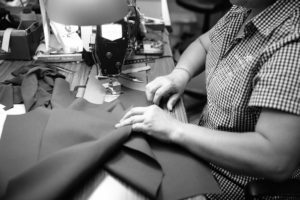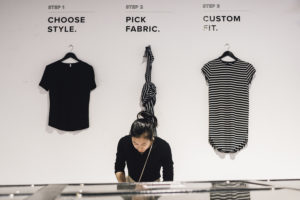The rise of the ethical fashion movement has inspired many in the established fashion industry, both entrepreneurs and disrupters to create new products and business models aimed at improving the negative impacts created by the textile, clothing and footwear (TCF) industry. A change in attitudes was catalysed for many by the Rana Plaza tragedy in Bangladesh on April 24, 2013, in which 1,134 garment workers died and thousands more were injured following a building collapse. The garment workers and their concerns about their safety had been ignored and the result was catastrophic. One outcome of the tragedy has been a renewed focus on the safety and conditions of garments workers. That, along with a mix of cutting-edge technologies and traditional craft are seeing the industry making moves on a path toward greater sustainability and ethics.
As interest in ethical and sustainable fashion markets grow, consumers face difficultly navigating what these terms mean, and distinguishing those who are truly committed to ethics sustainability and transparency, from those looking to capitalise on the movement.
Ethical Clothing Australia (ECA®) oversees an accreditation program for TCF businesses making their products in Australia, via an annual compliance audit. It’s a voluntary program and up to local businesses whether they wish to participate or not in the accreditation program. The accreditation is focussed on ensuring that local manufacturing workers, many of whom are homeworkers, are being paid appropriately, receiving all their legal minimum entitlements and working in safe conditions throughout the entire supply chain. As manufacturing supply chains can be complex, ECA works collaboratively to ensure that legal obligations are met.
 Photo Credit: ECA
Photo Credit: ECA
There are currently about 100 businesses accredited with ECA, offering a range of high quality, locally made products—from fashion to footwear, schoolwear, protective workwear, swimwear and more. These businesses include national retailers, leading Australian designers, emerging ethical and sustainable fashion labels and manufacturers. They are committed to making locally and retaining TCF jobs and skills in Australia, and a number of those businesses based in the Sydney area are committed to tackling some of the major environmental and sustainability challenges impacting the industry globally.
ECA accredited businesses are embracing new technologies to reduce their environmental impact and reduce waste, as well as offer consumers a point of difference in the highly competitive clothing market. Citizen Wolf is a start-up fashion label and manufacturer working with cutting-edge algorithmic design and laser cutting machines to bring tailoring into the 21st Century. They produce made-to-order t-shirts, hoodies and singlets from their Darlinghurst micro factory using natural fibres including certified organic cotton, unmulesed merino wool and ‘deadstock’ fabrics otherwise destined for landfill. Both Citizen Wolf’s design and manufacturing techniques significantly reduce the wastage inherently involved with clothing manufacturing.
Photo Credit: Citizen Wolf
Sydney-based Bianca Spender creates sophisticated tailored pieces by working with predominantly natural fibers. Growing up in the industry and working alongside her mother, renowned designer Carla Zampatti, Spender is an outspoken advocate for a cleaner, slower fashion that puts respect for the planet and its people at the centre of what she does. Earlier this year, Spender collaborated with ECA accredited social enterprise The Social Outfit and David Jones as part of a capsule collection using remnant materials. The capsule was created as part of Fashion Revolution week, a global campaign born out of the Rana Plaza tragedy, with all proceeds going to The Social Outfit.
As one of the first Australian businesses to manufacture with organic cotton, ECA accredited OCC Apparel has witnessed the growth of sustainable and ethical clothing firsthand. Accredited with ECA since 2014, the manufacturer now operates in three states, including its state-of-the-art factory in St Peters, where they manufacturer for a range of clients including non-profits, unions and designers. When OCC was established in 2004, there was no certified organic production in Australia, forcing founders Nick Barclay and Andrew Quinn to look abroad for their supply. Almost 15 years later, Australia has a thriving organic cotton industry, and OCC is a leading manufacturer of organic t-shirts.
Related Articles:
![]() “SUSTAINABILITY IN FASHION IS THE FUTURE: KRIE DESIGN”
“SUSTAINABILITY IN FASHION IS THE FUTURE: KRIE DESIGN”
Of course, these are just a few of the Sydney based businesses making ethically accredited clothing. Celebrating 50 Years of making in Australia this year, Cue is Australia’s largest manufacturer of women’s fashion, and has a long and proud tradition of producing their garments in Australia.
Photo Credit: CUE
With Australians among the highest consumers of textiles per capita in the world, and a staggering 6,000 kg of clothing being discarded every ten minutes—much of it made from non-biodegradable polyester—it is vital that the businesses and consumers are making changes to reduce the negative impacts of fast fashion and to reduce waste in the industry. Governments also have a role to play in supporting those who are moving towards a better industry.
Encouraging consumers to shop locally and be informed about where their clothes come from, looking for solutions offered by new technologies, and considering the full life cycle of a garment are fundamental first steps.
A concerted, multi-stakeholder approach involving business, government, civil society and consumers is clearly needed to address the challenges we face when asking questions about who made our clothes, and in which conditions. Encouraging consumers to shop locally and be informed about where their clothes come from, looking for solutions offered by new technologies, and considering the full life cycle of a garment are fundamental first steps.













